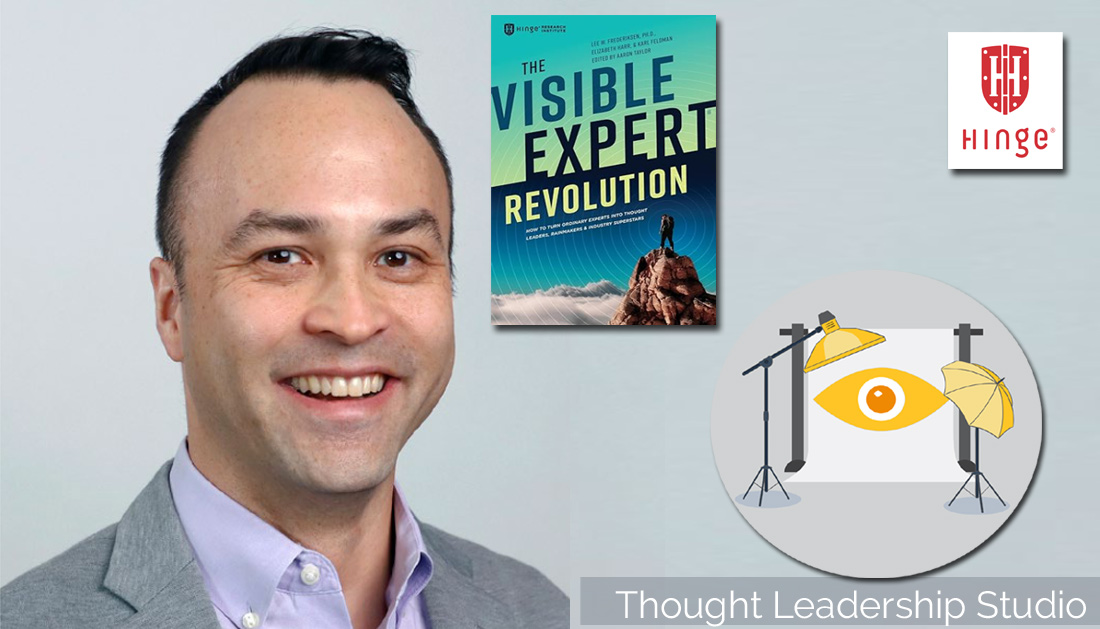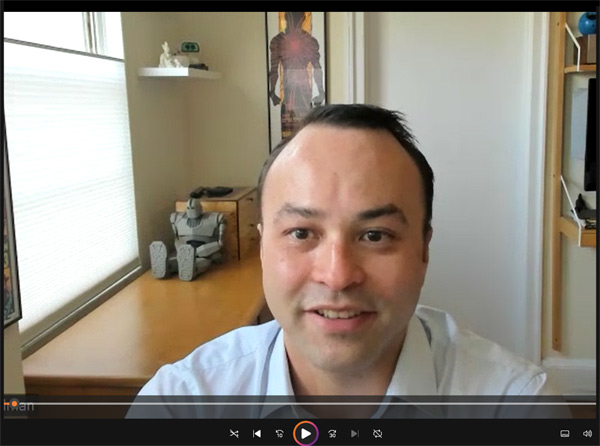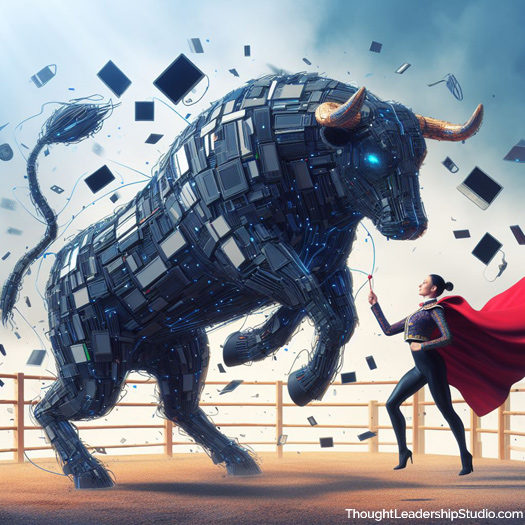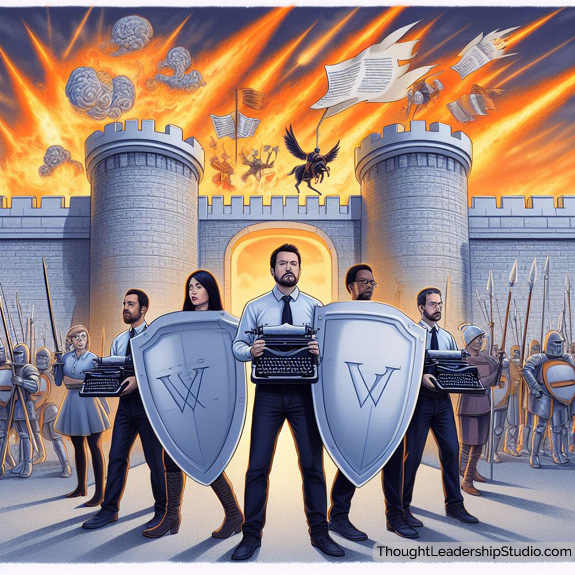Thought Leadership Studio Podcast Episodes:
Karl Feldman Interview - AI and The Visible Expert Revolution
Episode 55 - Exploring the Intersection of AI and Marketing: the Challenges and Opportunities it Presents.

#ai, #artificialintelligence, #authors, #chatgpt, #interviews, #marketing, #marketingstrategy, #marketresearch, #thoughtleadership, #thoughtleadershipexamples, #thoughtleadershipmarketing
Or Click here to listen or subscribe on appWhat this episode will do for you
- Gain insights into Karl Feldman's journey from programming to marketing and how it's possible to pivot and succeed in the field of professional services marketing.
- Discover the importance of bridging storytelling with the technical side of marketing and how this can create a unique thought leadership position.
- Understand the impact of AI on marketing and how it's both a powerful tool and a potential challenge when it comes to maintaining the provenance of your ideas.
- Explore strategies for building your visibility as a thought leader, even if you're just starting out, and learn about the different expert profiles that can set you apart.
- Consider the role of experimentation and industry leadership in gaining traction for your thought leadership model and reaching a broader audience.
Karl Feldman.
In this episode, I interview Karl Feldman, who leads Hinge Marketing's architecture, engineering, and construction practice. Karl is also the co-author of the new book The Visible Expert Revolution. We'll discuss the intersection of AI and marketing, as well as the challenges and opportunities it presents.
Karl emphasizes the importance of understanding one's audience, categorizing risks and opportunities, and staying accountable in order to leverage AI effectively. He also highlights the need for responsible use of AI tools and the importance of choosing the right partners.
Some of Karl's coordinates:
Curated Transcript of Interview with Karl Feldman
The following partial transcript is lightly edited for clarity - the full interview is on audio. Click here to listen.
Chris McNeil: So I'm your host of Thought Leadership Studio, Chris McNeil, and I'm sitting here with Karl Feldman. Karl leads Hinge Marketing's Architecture, Engineering and Construction practice. He guides clients through the complexities of research, marketing strategy, brand strategy, and high performance website development.
Before joining Hinge, Karl was director of marketing at HITT Contracting, a top 50 general contractor with 700 employees in five offices nationwide. Karl blogs and speaks about professional services, marketing and strategy, local and national events for leading associations such as AIA, ACEC and SMPS. Karl studied Computer Science at Virginia Tech and lives in Washington DC with his wife and son. Great to have you here, Karl.
 Karl Feldman: Thanks for having me, Chris.
Karl Feldman: Thanks for having me, Chris.
Chris McNeil: Absolutely. And I'm fascinated by some of your background because I understand that you were in programming at one time and then pivoted to marketing.
Karl Feldman: Yeah, it's a tangled web we weave, right? I think I've found my home with professional services and working with engineering, architecture, construction firms and all kinds of technology and consulting professional services. But yeah, I actually originally, way back in the day, I was very interested and motivated to get into commercial or industrial design and.com happened first. The dotcom revolution happened as I was in school and I said, wow, well this is natural to me. I can do this. And just kind of pivoted into computer science.
I joke a little bit with folks I work with. I have some of the engineering in my blood, half of my family are some type of engineers. We have some CPAs mixed in there, but there's a certain type of thinking that goes along with that. And I hope that I tread that balance a little bit. My wife is a writer. It's like staying at the holiday and creative, more language focused. But I really appreciate both worlds and I think as a entry to our discussion, it is a fascinating and exciting time that we're living in right now because these things are really coming together.
Bridging Storytelling with the Technical Side of Marketing
Chris McNeil: I think it's fascinating. You have kind of a foot in both worlds. I can relate to that. I've done programming and written software, just gotten some recognition and also then pivoted to marketing. And the interest to me in part is the perception of a lot of business people who may not be marketers themselves but have to either learn to do it themselves, or have a CMO, or they'll hire an outside firm if they're a certain size or try to do it internally if they're smaller.
 And it seems you've got the story side, the storytelling of marketing, the engagement with the marketplace around telling your company's story and telling the story of the customer journey and how it's going to impact it. But then you have the technical side of things like search engine optimization.
And it seems you've got the story side, the storytelling of marketing, the engagement with the marketplace around telling your company's story and telling the story of the customer journey and how it's going to impact it. But then you have the technical side of things like search engine optimization.
Now the integration of artificial intelligence and some people just seem to perceive it as a technical thing since we have to do it on the web. But how do you bridge that? How did you make that bridge yourself between the storytelling side and the technical side of online marketing?
Karl Feldman: Gosh, that's a great way to frame it up and I think it's at a high level, I think what general public is realizing now is, or some or realizing is that there is a more human layer, an easier to interact with layer that can sit on top of very complex engineering. And I think maybe the perspective, and it sounds like you share a little bit of this, having background and software development, the level of complexity in these systems is staggering.
For the general public, I think ChatGPT, that's the one on everybody's mind, Open AI everybody's watching what they're doing and Microsoft - they're going to maintain their lead. It really comes down to, and I think I've spent some time in branding and marketing, is marketing and branding Open AI? At Hinge, we've actually been using tools that utilize generative AI machine learning for six, seven plus years in a mature state. We work with partners like Qualtrics where everything from sentiment grading and all of these things, there's a lot that goes on behind the scenes. We've taken the view early on just like we did with remote and hybrid work, which is another trend going on.
I think we were probably early adopters, certainly for professional services in that type of work and it wasn't really connected with audiences in a lot of places. We were taking, if you look at our content, we're very educational, we're working on it and we're always thinking about, because we're researchers like data in mind - Where is the audience? Where do we need to bridge the gap? Because even as a business, our focus on professional services, I started in B2C e-commerce and I think that was where I first connected the two, the marketing, which is really engineering of audiences, brand all these things and direct marketing and e-commerce at a different pace.
And then made my way through to business to business global brands like Herman Miller, folks like that. And then eventually it's large general contractors and (inaudible) Phillips of the world and these guys where we have this massive technology in the background, but it's all service driven, it's all people. So I think the connection for me is especially in the kind of complex and very technology driven world, whether you see it or not, engineering or understanding the human experience and what is actually valuable and relevant is fascinating to me.
Layers of the Human Side and Technology
I mean I think everybody ... I'm a complex person. I got lots of different layers and things I enjoy as a whole person and all of that, but sometimes I wonder, I'm like people are logical, right? Professional services people, it can be really confusing sometimes for systems, but I love that challenge. The marketing and understanding journeys through different paths, connecting the real world experience with online, fascinating to me it's huge.
 Chris McNeil: So you have the deep layer of the technology that enables the mass consumption of media and the emergence of communities and social media, and I don't just mean like an given platform, but across platforms, communities with common interest and common values that might represent a market segment to a particular company.
Chris McNeil: So you have the deep layer of the technology that enables the mass consumption of media and the emergence of communities and social media, and I don't just mean like an given platform, but across platforms, communities with common interest and common values that might represent a market segment to a particular company.
But these psychological dynamics don't fit maybe as easily into the systems view of an engineer who would design a system through logic and software. But then we have the customer, I'm trying to keep this relevant to the listener no matter who they are - if they're a solopreneur or a founder, a CEO marketer or influencer - and when we talk about, but we're all talking about influence. I'll deal with online influence and building an audience around a message, creating a unique message. But I found sometimes the challenge is to not get too deep into weeds with people who are non-technical when you have to communicate the technical side of it to some extent, but not lose focus on this is about be in and building an audience around being human too.
Karl Feldman: Chris, you're spot on. I mean we practice a little bit of what we preach, especially professional services. We just came out with a new book called The Visible Expert Revolution and one of the thesis that I focused on in that book was really connecting what makes a powerful expert, what kind of qualities can you focus on and are the different types of people that are well suited to a different technique to build your visibility as an expert.
You mentioned solopreneurs or intrapreneurs at large organizations and both have similar and different paths at the same time. And when you think about it, we're talking about technology and AI, like it or not, there are always these layers and filters in our interaction and sometimes that can be really powerful and advantageous if you're using it right. It's also very easy to run afoul of that and one of our partners behavioral scientists and when we were talking over lunch sometime and we said the humans can't keep up with this pace.
We are subject to the speed of this engineering. We're all living in this experiment. Basically you talk about social media and the kind of silos and relevance and that type of thing. It's a boon for a marketer. You can see data on a level that's unimaginable 10 years ago and at the same time that shifts the will of mass masses of audiences and you talk about misinformation and what's real, what's not real.
 And we start getting into multimodal AI where we're talking about written language and video and images - it's in an infancy kind of now, but that's going to get sophisticated really fast. So there's a bit of catching up for us as humans to do with the tools we've created when engineers are talking about we don't really understand exactly why the systems hallucinate in this way. That's a pretty complex system.
And we start getting into multimodal AI where we're talking about written language and video and images - it's in an infancy kind of now, but that's going to get sophisticated really fast. So there's a bit of catching up for us as humans to do with the tools we've created when engineers are talking about we don't really understand exactly why the systems hallucinate in this way. That's a pretty complex system.
The Unpredictable AI Rodeo
Chris McNeil: Yeah, well these emergent properties that are coming up and all this seems to me like a rodeo and you have this massive bull of AI that you just released and you thought it was going to do one thing but it might do something else. You might be in trouble if you're not really skilled at avoiding the bull running through you.
Karl Feldman: Right. I mean I think one of the high level practices we preach because you hear so much about what's a responsible way to use AI and certainly there are all kinds, it is kind of like categories of responsible use. Are you feeding the wrong kind of information into these things that's opening up liability. Are you using it in a way that's going to create the most impact?
AI as Co-Pilot
And then what is your intent with these tools and are you using these technologies as a good copilot versus a complete, it's not a replacement for something. What you just mentioned is spot on. It's like you have to know when it's going off. One of the main ways we use these tools in a writing capacity that's concrete and easy to understand is it's a devil's advocate.
It will represent the norms. Here's what it would be. And that becomes even more interesting as open AI is out and grazing on the internet at large. You can see what the median is and that might help inform the human pilot. This is where we can be different, here's how we can be relevant and impactful and different from the norm ...
Chris McNeil: Which is powerful. I love that. And that's very aligned with this. I think it makes a great way of getting a baseline thinking to contrast with what in my terminology would be called a thought leadership position, which also makes me fascinated by the name The Visible Expert Revolution, which seems very aligned with the concept of strategic thought leadership, which is what this podcast is all about. So what makes someone a visible expert?
 Karl Feldman: Well, you touched on an important point earlier, the ability to relay something very complex in simple terms. I remember we were working with one owner of a firm that was acquired by large software platform, but when they were solo they worked on finite element analysis, pretty techy stuff.
Karl Feldman: Well, you touched on an important point earlier, the ability to relay something very complex in simple terms. I remember we were working with one owner of a firm that was acquired by large software platform, but when they were solo they worked on finite element analysis, pretty techy stuff.
And there was kind of typical in our world as we're building brand marketing strategies and things working, especially with technical folks and engineers, one of the most common objections is I can't write in these general terms. My colleagues will laugh me out of the room. I can't do that. There's no way I'll damage my career if I speak about it at this kind of high level. And so it takes practice, practice, try, see the results, lean into the kind of data analysis.
And I'll never forget one of the owners wrote a blog post connecting some of the theory and methodology to how a refrigerator works and as close to viral as you can get into engineering community, it went out and they actually landed some major contracts because of that. And then he was a believer, okay, I get it now. This seemed really, I think he used the actual word, it seemed dumb to me in the beginning, but I get it now. It's connecting something in a way that the most important audience understands. And if you're speaking to C-suite or executives, they're not going to think in the same terms as an engineer would
Or data science, it's a little different. You have to be able to bridge these two. And that's something that is in some ways uniquely human. These tools can help with that. It can help craft and polish and build these things, but it really does take the direction and intention of a person to understand how best to do that.
Wikipedia Editors as Guardians of the Threshold of Paradigm Change
Chris McNeil: Well the copilot thing - and the visible expert as being someone who can maybe use relevant metaphors to bring, a complex concept to life might be one way. And what do you think about AI as proliferating what you might call groupthink? The dominant paradigm may not be the right way to go. And something I've noticed on Wikipedia is that upstarts who challenge the dominant paradigm get a hoard of guardians of the paradigm in the form of Wikipedia editors who shoot them down and take over the page.
 And I'm thinking of people like Rupert Sheldrake and Graham Hancock who - whether or not you take their point of view - are certainly shaking things up. And they're worth listening to, but they are minimized on there.
And I'm thinking of people like Rupert Sheldrake and Graham Hancock who - whether or not you take their point of view - are certainly shaking things up. And they're worth listening to, but they are minimized on there.
And I wonder if with the types of bots that AI uses, I think they're similar to what Google uses to crawl to web if they could just proliferate groupthink rather than enable innovative thinking - or is that the opportunity for the visible expert or the thought leader to see that dominant paradigm more clearly and offer a counterpoint to it?
Karl Feldman: Yeah, Chris, I think it's both. When you step back from it, I'll go back to it, it's not new. We have been living in this, it's proliferating on a, it's accelerated because of the marketing blitz and understanding at large, but even general interest is beginning to wane, right? You see open AI's traffic starting to dip because okay, well this is novel and interesting, but okay, not really sure how I'm going to use this best or you when you think about on a broad scale, how you connect with that.
One of the things actually someone, one of my colleagues at Hinge, we were talking about this and I forget how it came up, but I was like, did ever expanding sea of beige? And you've got, you hear these wonderful buzzwords like AI, cannibalism, right? It's feeding itself, it's feeding its own kind of engine and they become more, this technology is built to be a sycophant. What do you want to hear? I'll tell you, it's all response based, so you get some strange distortions that way and it will evolve, but it has that kind of layer of, it appears very normal.
So I think more and more, and I have a 12 year old son and if you ever need someone to take you down a notch or give a fresh perspective, 12 year old pretty good at that. When he learned the word hypocrite, the world opened up for him. I was happy to point out, well you say this, but what you do for a living makes you think a little bit, but it'll be interesting to see how the generations that are living through this at an early stage in your career now evolve to filter these things or catch up with and kind of grade that. And I think Hinge, our working cohort is multi-generational.
We have everybody from fresh out of school all the way to retirement, everything. And it's fascinating as a researcher to understand how these different cohorts use some of these different tools or what's the kind of direction of that. There's areas where the traditional experience really gives a very valuable perspective and some of the advice that we share with firms is you need a cross-functional team to really come up with a powerful strategy. I think from legal tech, marketing, growth, executive sponsorship to really make the best use operational roles. There's go to market strategies, all of these things will be touched in some way and there's also regulatory, I've heard horror stories of folks feeding in sensitive information not knowing where this goes, what's the endpoint for this?
That's like a CIO's nightmare and it is happening every day, so you need to have just in the dawn of social media, we're responding faster to it now because kind of had a little bit of that rodeo, but you have to have the controls in place but also be open enough to explore the possibilities because at least in my mind, there's no question it changes the face of how creative work is done, how production is done. There are so many industries that would be touched by this. It's larger than the dotcom revolution, much more pervasive, but I am not sure that it's as easy to understand how it'll shape, shape our society.
Maintaining Provenance Over Ideas in this World of AI
Chris McNeil: We don't really know. It's an exciting time for sure and bring it to as best I can. What can we talk about that's relevant to the listener that you can take action on? If someone wants to get across a new way of looking at an industry, if they want to promote a particular point of view or philosophy about how things are done in their field or profession, how would the best make you have a lot of experience to talk about this from how would the best maintain provenance over their ideas in this world of AI instead of just having them ingested without pointing back to them?
And I'll give you a quick example. If I asked ChatGPT what an Ideavirus is, it points back to Seth Godin's book and mentions Seth Godin. So that's a great example. If you're big enough, you're out and you create a model with proprietary words, you can maintain your provenance in this AI world, but somebody just starting to build an audience and has some unique ideas, how can they maintain provenance and not just give away all their thinking without getting any credit for it?
Karl Feldman: I guess in some ways it's a new challenge in other ways it's the age old challenge. As you get to the tipping point of visibility, that's really the book, the whole concept behind visible expertise, it follows on that and the path is not the same for everyone speaking directly to audiences smaller starting up, I've got some unique ideas, how do I go?
I think the first thing is understanding what kind of profile fits you best as an expert. There are different constructs that we came up with to kind of simply identify that sometimes it might be two or three of these in different proportions, but like a laser type expert that is very focused on a very specific subject matter, a bridge expert that's connecting to things maybe like we talked about technology and people and marketing and branding, personality or contrarian.
You mentioned this also with Wikipedia. Do I have something just provocative to say that's different and I think AI can be a powerful toy. I share that openly. Think of it as a powerful devil's advocate of what is the norm, what would you be presenting that is a little differentiated, more original. And I also think it's a reminder that so many folks have said this in so many different ways. There's very little that's truly original. This technology really is a mirror to show anyone that had any illusions about that, how true that is. But at the same time, those distortions around the algorithms and rules and the authority of certain experts, it distorts some of that.
 You may have an idea that's very close to something but different and unique and impactful, but the sheer weight of a Seth Godin might just overpower you. And it's not just, I'll say maybe 10 years ago, a lot of the discussions we were having were educating teams on what content marketing was SEO. Now that's taken for granted. Okay, we get this, but now that's just one little piece of an integrated visibility plan. So
You may have an idea that's very close to something but different and unique and impactful, but the sheer weight of a Seth Godin might just overpower you. And it's not just, I'll say maybe 10 years ago, a lot of the discussions we were having were educating teams on what content marketing was SEO. Now that's taken for granted. Okay, we get this, but now that's just one little piece of an integrated visibility plan. So
Understanding what's right for you and where are your differentiating elements that's important and shifting and different depending on your situation. I mean I'll use traditional methods, right? You think of event networking in-person events, you see some pushback to that now because that's something that's very difficult. You can stand out from the noise that way because you're physically present.
If you're able to connect and extend that through online strategies, even more powerful. I mean we have ourselves and clients, we can actually watch engagement on the ground with teams at events and see are we engaging with the right things? Who are we speaking to? What's the nurture path next? These things connect together, but where's a point where you're going to stand out from the crowd? I think that becomes, that's a big consideration and if you're thinking about that, you're ahead of most.
Chris McNeil: Well, and if you're maybe organizing your model in a way that like you mentioned earlier is understandable and while there may not be much new, there's certainly new ways of organizing information that can elevate a particular audience out of a stuck mental model that doesn't serve 'em as well as what you're offering. And experiment might be what, and I'm learning this through experimentation, is how much traction do you need for your organized set of ideas, which in my language might be called a thought leadership model. Your organized set of ideas is going to reflect back to you in this AI world. Is it worth maybe instead of just talking very specifically to the small audience who might be your customers, instead open it up to being a leader of an industry niche aim to get in industry publications and saying, this is how we all ought to do this. I've see an opportunity to move this whole industry forward and give away your knowledge because if it's quoted in enough places, then that model would be more likely to reflect back to you. But some people feel like they don't want to give up knowledge that way because knowledge is power. Of course.
***************************************
The transcript is lightly edited for clarity and is a partial transcript- the full interview is on audio. Click here to listen.
***************************************
Free Stuff and Offers Mentioned in Podcast
***************************************
***************************************